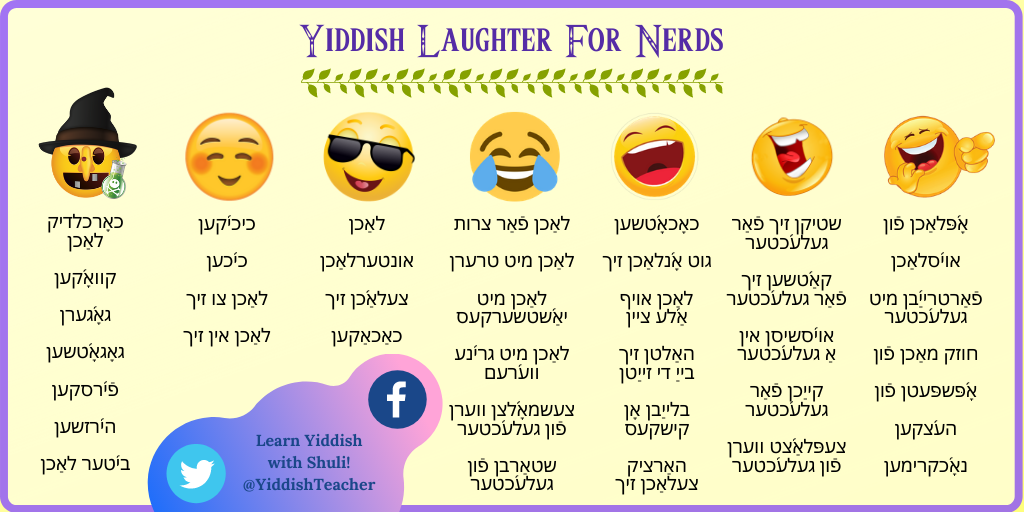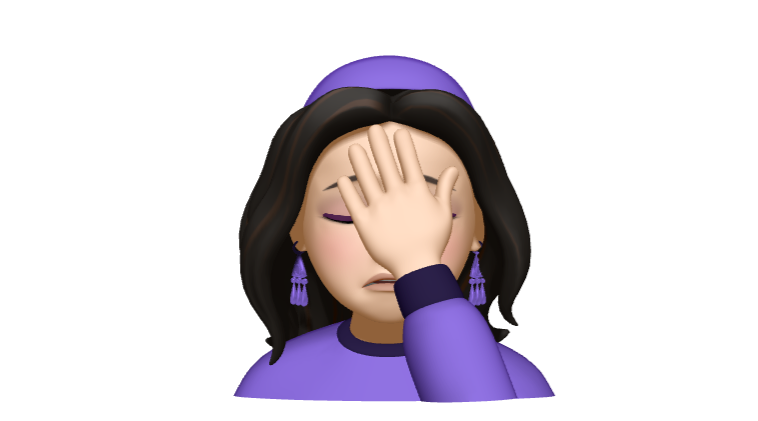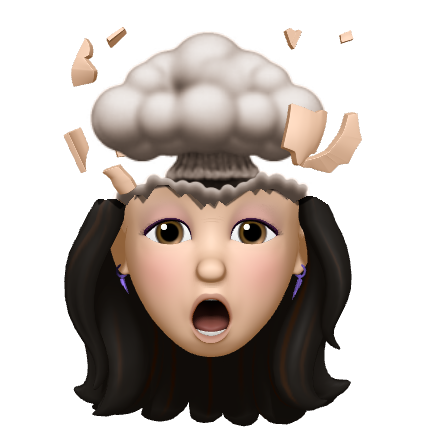|
9/23/2020 3 Comments 50 Ways to Say "Laugh" in YiddishNormal Laughter1) lakhn - to laugh 2) tselakhn zikh - to laugh out loud Witchy Laughter3) khorkhldik lakhn - to laugh with a raspy voice 4) kvoken - to cackle like a hen 5) gogern - to cackle like a goose 6) gogotshen - to cackle like a goose 7) firsken - to snort like a horse 8) hirzhen - to snort like a horse Giggly Laughter9) khikhen - to giggle 10) lakhn tsu zikh - to chuckle to oneself 11) lakhn in bord arayn - to chuckle into your beard 12) lakhn in di vontses arayn - to chuckle into your moustache 13) lakhn in arbl - to chuckle into your sleeve 14) lakhn in di foystn - to chuckle into your fists 15) unterlakhn - to chuckle Onomatopoeic Laughter16) khikhiken - to laugh with the words "hee-hee-hee!" 17) khakhaken - to laugh with the words "ha-ha-ha!" 18) khokhotshen - to laugh with the words "ho-ho-ho!" Crying Laughter19) lakhn far tsores - to laugh through tears 20) lakhn mit trern - to laugh with tears 21) lakhn mit yashtsherkes - to laugh out of misery (lit. "to laugh with lizards") 22) lakhn mit grine verem - to laugh out of misery (lit. "to laugh with green worms") Hearty Laughter23) gut onlakhn zikh - to have a good laugh 24) lakhn mit ale tseyn - to laugh with all your teeth 25) hartsik tselakhn zikh - to laugh heartily 26) haltn zikh bay di zaytn - to be in stitches 27) mitlakhn mit - to join in the laughter Extreme Laughter28) shtarbn fun gelekhter - to die from too much laughing 29) tseshmaltsn vern fun gelekhter - to melt away from too much laughing 30) fargeyn zikh in gelekhter - to dissolve into laughter 31) blaybn on kishkes - to blow your intestines from too much laughing 32) shtikn zikh far gelekhter - to choke from too much laughing 33) katshen zikh far gelekhter - ROFL (rolling on the floor laughing) 34) kaykhn far gelekhter - to gasp with laughter 35) oysshisn in a gelekhter - to hoot with laughter 36) tseplatst vern fun gelekhter - to explode from too much laughing 37) tsezetst vern lakhndik - to shatter from too much laughing 38) koym aynhaltn zikh dos gelekhter - to barely contain one's laughter Derisive Laughter39) oplakhn fun - to laugh at someone 40) oyslakhn - to ridicule someone 41) fartraybn mit gelekhter - to laugh someone away 42) khoyzek makhn fun - to make fun of someone 43) opshpetn fun - to scoff at someone 44) hetzken - to jeer at someone 45) nokhkrimen - to mock someone States of Laughter46) koym kenen zikh aynhaltn dos gelekhter - to be helpless with laughter
47) bakumen a lakh-histeriye - to have paroxysms of laughter 48) dos tsugeshtelte gelekhter - canned laughter 49) der oyfbroyz fun gelekhter - the roar of laughter 50) s'hot im ongekhapt dos gelekhter - he was overcome with laughter
3 Comments
There are two major, recent online dictionaries. One is verterbukh.org and the other is englishyiddishdictionary.com.
I've heard ideological gripes about both. On one side are those who complain that englishyiddishdictionary.com is full of all sorts of newfangled words but doesn't include a lot words that proste yidn (simple Jews) use in the streets. On the other side are those who complain that verterbukh.org is not comprehensive enough and includes lots of daytshmerisms (Germanisms) that should be avoided. But I think it's also important to realize that before these were online dictionaries, they were printed dictionaries, with all the limitations that come with printed text. Verterbukh.org was printed as a Yiddish-English dictionary, meaning that you use it to look up a Yiddish word and see what it means in English. This is obviously very useful if you're reading Yiddish texts and you need to look up what something means. EnglishYiddishDictionary.com was printed as an English-Yiddish dictionary, meaning that you use it to look up an English word and see how to say it in Yiddish. This is obviously very useful if you're speaking or writing Yiddish. And here's why that matters. When you read Yiddish literature, you'll probably encounter a lot of daytshmerisms -- words that are ideologically shunned by many Yiddishists. SO, even though one might, given their particular ideology, not want to use daytshmerisms, it is still essential that you have access to a dictionary that includes them. Because when you encounter them in literature, you need somewhere to go to look them up. That's one of the great values of verterbukh.org. On the other hand, if the goal of an English-Yiddish dictionary is to tell you what Yiddish words to use, then it makes sense that, within a particular Yiddishist ideology, one would not include many daytshmerisms. After all, if you don't want people to use daytshmerisms, then why instruct people in a dictionary to use them? So one of the great values of EnglishYiddishDictionary.com is that the words it instructs us to use are those that are in line with anti-daytshmerish ideology. OF COURSE, all of this is totally flipped upside down and around and made meaningless when the dictionaries are digitized, as they have been, and are searchable in both directions, as they are. Even though verterbukh.org was printed as a Yiddish to English dictionary, you can search for English words on the website and find Yiddish equivalents. Even though EnglishYiddishDictionary.com was printed as an English to Yiddish dictionary, you can search for Yiddish words on the website and find English equivalents. And here's why this matters. If you are reading a book and you find a daytshmerish word that you don't know the meaning of, you may well not find it at EnglishYiddishDictionary.com, even though the latter can be searched in both directions. You would have to consult verterbukh.org. On the other hand, if you're speaking or writing and you want to know how to say something in Yiddish, verterbukh.org will not be very useful for many of the more recent terminology that has had to be developed in the 21st century. For that, you need to use EnglishYiddishDictionary.com. So which one should YOU use? I encourage you to consider why you're looking for an online Yiddish dictionary. Are you reading primarily older literature OR recent Chassidic literature? Go with verterbukh.org. Are you reading Yiddishist-oriented literature, or learning to speak in as comprehensive a way as possible? Then englishyiddishdictionary.com is the dictionary for you. Or, like me, perhaps you'll find that you have need for both. I subscribe to both, as they tend to complement each other: what I don't find in one dictionary, I'm likely to find in the other. One last thing: the other dictionary that I highly recommend, in addition to these two, is any free online German dictionary. If you're reading old newspaper articles from the early 20th century, many of them are full of SO MUCH GERMAN that's not at all mainstream Yiddish, and many of those words are not in either verterbukh.org or englishyiddishdictionary.com. So for such words, you would need to guess the German spelling and look them up in a German dictionary. Again, which dictionary you find most useful really depends entirely on why you're using a dictionary and what kinds of things you're using Yiddish for. And depending on how you use Yiddish, you may find that you really need multiple dictionaries, not simply because "oh one might have a word the other doesn't" but because they are fundamentally different in their orientation and purpose. 9/6/2020 2 Comments When Yiddish Dictionaries are Confusing (aka, How Do I Say "I'm Excited" in Yiddish???!!!)I am SOOOO EXCITED to write this blog post! But... how do you say "excited" in Yiddish? As you can see, this dictionary is rather unhelpful. It gives three different translations for "excited" - "oyfgehaytert," "oyfgetrogn," and "tseyakhmert." And it doesn't stop there! "To be excited," the dictionary tells us, is "hitsn zikh," "kokhn zikh," "nervirn zikh," "tsekokhn zikh," "tsehitsn zikh," "ontsindn zikh," and "tseyakhmern zikh." WHATTTTTTT That's 10 different ways to say "I'm excited." How in the world can I possibly know which of those options to choose? This is starting to feel like a multiple-choice pop quiz. And I don't like pop quizzes. Do you? As I ponder this entry in Uriel Weinreich's classic Modern English-Yiddish Yiddish-English Dictionary, my excitement turns quickly into frustration. And that is exactly the point: "I'm excited" can mean "I'm happy" or "I'm upset" or "I'm horny" or "I'm frustrated" or, or, or.... and G-D SAVE MY SOUL if I should open this blog post by telling you that I'm horny or enraged, when what I really want to say is that I'm really looking forward!!! Now, I'm a resourceful lady, and I'm sure that you're fairly resourceful, as well. So let's just do a reverse translation. If the English side of the dictionary tells us that "excited" can be "oyfgehaytert," "oyfgetrogn," or "tseyakhmert," then let's just flip over to the Yiddish side and look up each of those words individually. And here's what we find out. According to Weinreich's dictionary, "oyfgehaytert" means "excited." NOT HELPFUL! "Oyfgetrogn" can mean either "indignant" or "on friendly terms." That's a contradiction! And "tseyakhmert?" Weinreich's dictionary says "excited, upset." OK, so does that mean excited OR upset? Meaning, it could sometimes mean happily excited and other times upset? Or, let's suppose that it's always negative: is it angry upset, sad upset, or worried upset? TL;DR - I STILL DON'T KNOW WHICH WORD MEANS "I'M EAGERLY LOOKING FORWARD!!!" Let's be real for a minute. Let's not get excited. Weinreich's dictionary was published in 1977 - that's almost 45 years ago. That's 11 whole years before I was even born, and a good 20 years before the rise of internet search engines. Thankfully, today, we have a number of better dictionaries. The most useful, for our purposes, is the Comprehensive English-Yiddish Dictionary, edited by Gitl Schaechter-Viswanath. So let's see what this newer dictionary says for "excited" -- Okay, now we're getting closer! Unlike Weinreich, Schaechter-Viswanath tells us which of these words for "excited" means "angry excited," "joyful excited," or "sexually excited." But now we have another problem. Weinreich gave us three different adjectives (plus 7 verbs) to mean "excited." Schaechter-Viswanath gives us three adjectives for "angry excited," three adjectives for "joyful excited," and five adjectives for "sexually excited"..... and that's not even touching on verbs! The unfortunate truth is that, to a certain extent, beginners are going to struggle with this. Even advanced students will struggle. The world of Yiddish synonyms is vast and, well, extremely nuanced. No single dictionary is going to give us the level of nuance and context that we need to choose "the perfect word." But I'd like to offer you an additional resource, one that works in tandem with a dictionary while infinitely extending its range of powers. That resource is JOCHRE. What is JOCHRE?Glad you asked, friendly blog reader!
JOCHRE is a free, fully searchable online database containing thousands upon thousands of Yiddish books. Look up, say, "oyfgehaytert" and you'll get 738 results from Yiddish novels, poems, biographies, academic tomes, and more. Look up a word like "grin" (green) or "shvarts" (black), and you'll get over 8,000 results. The beauty of JOCHRE is that, unlike a dictionary, it lets you see these words in context. And let's be real: it's gonna be a huge amount of work to look up every word for "excited" to see how they're used in context, in order to figure out which one is precisely the right one to use in a given setting. If you're looking for a "quick and dirty" translation of a word, JOCHRE won't help. But it's absolutely FASCINATING for diving into the language in a far deeper and way more nuanced way than one could ever do with a dictionary alone. Confession: I've spent hours just playing around on JOCHRE, looking up words like "eynhorn" (unicorn), "yam-meydl" (mermaid), and "vampir" (vampire), out of pure curiosity and intrigue, just to see what I'd find. Why don't you try the same? Pick a word, or a topic, that you're curious about, and just see what pops up. Have fun seeing these words in context, and let it not only add nuance to your vocab, but also expand your literary awareness. You'll discover FANTASTIC texts by FANTASTIC authors who are TOTALLY OBSCURE, because their names don't end with "olem aleykhem" or "ashevis singer" or "eretz." So what are you waiting for? Go forth and HAVE FUN exploring the world of Yiddish nuances! And let me know in the comments what all you find out. Ikh kuk shtark aroys! (I'm excitedly looking forward to it!) |
Sign up for e-mail updates!ArchivesCategories |






 RSS Feed
RSS Feed